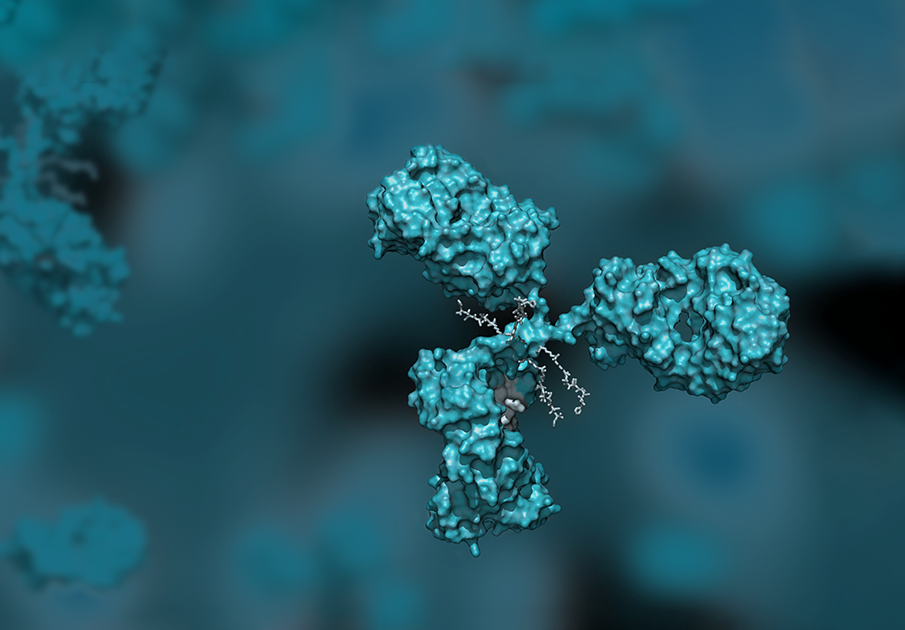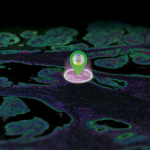
nCounter® ADC Development Panel
Helping Your Research
ADCs require the development and optimization of multiple steps in a complex process that combines chemistry and biology for the delivery and release of the drug. Although cell-based assays provide valuable endpoint readings, a more informative assay that characterizes the various stages of ADC development can greatly expand on insights gained during the process.
The novel nCounter® ADC Development Panel enables researchers to answer complex questions critical for the success of Antibody Drug Conjugates throughout discovery, pre-clinical and clinical development. The biological function can be assessed using quantitative molecular characterization spanning 6 stages in the lifecycle of the ADC. The comprehensive gene content covers:
- Mechanisms of resistance biology
- Immunogenic cell death
- Aspects of the immune response
- Traditional and emerging MOAs
- Current and developing targets for ADCs
The success of both traditional chemotherapy and immunotherapy as part of a combination treatment can be evaluated, and the panel can be customized with tumor-specific or ADC-specific targets of interest.

Panel Selection Tool
Find the gene expression panel for your research with Panel Pro
Find Your PanelProduct Information
The ADC Development Process
The ADC Development Panel can be used throughout the ADC development process to characterize all the essential stages of ADC function.


Functional Annotations
The ADC Development Panel measures 6 distinct stages of ADC delivery and response in a single gene expression panel, gauging the success of both traditional chemotherapy and combination immunotherapy. Pathway coverage is outlined in the table below.

Detect Contamination
Mycoplasma is a common contaminant in cultured cells. Mycoplasma compete with cells for nutrients and can have a profound impact on global gene expression levels within the cells. The ADC Development Panel contains a probe to detect mycoplasma, allowing for quick and easy detection of culture contamination when using cell-based assays to understand ADC activity. The panel can also be customized by adding up to 55 genes of your choice with a Panel Plus spike-in for studying additional sources of potential contamination.
Product Specifications
Customization with Panel Plus
Customize your research project by adding up to 55 user-defined genes of interest with nCounter® Panel Plus. Panel Plus capacity enables researchers to address content specific to the cancer type they are studying or specific ADC targets of interest.
The 18-gene Tumor Inflammation Signature (TIS) is included in the panel gene list and measures activity known to be associated with PD-1/PD-L1 inhibitors. Customers have the option to purchase a standalone TIS report with the ADC Development Panel.
- Includes four axes of biology that characterize a peripherally suppressed, adaptive immune response, including:
- Antigen presenting cells
- T cell/NK cell presence
- Interferon gamma biology
- T cell exhaustion
- Tissue-of-origin agnostic (Pan-Cancer)
- Potential surrogate for PD-L1 and mutational load in a research setting
Genes included in the ADC Development Panel provide unique cell profiling data to measure the relative abundance of 14 different immune cell types. These markers that identify specific immune cell types can efficiently define both the immunological activity of the samples as well as identify changes in immune cell populations in response to external stimuli from payload release. The table summarizes the genes included in each cell type signature, as qualified through biostatistical approaches and selected literature in the field of immunology.
Data Analysis
In addition to the standard nSolver™ Analysis Software, genes included in the ADC Development Panel are organized and linked to various advanced analysis modules to allow for efficient analysis of relevant pathways.
Analysis Modules available for ADC Development:
- Normalization
- Quality Control
- Individual Pathway Analysis
- Cell Profiling
- Differential Expression
- Gene Set Analysis
- Built-in compatibility for Panel Plus and Protein analysis
ROSALIND® Platform
ROSALIND is a cloud-based platform that enables scientists to analyze and interpret differential gene expression data without the need for bioinformatics or programming skills. ROSALIND makes analysis of nCounter data easy, with guided modules for:
Normalization / Quality Control / Individual Pathway Analysis Differential Expression / Gene Set Analysis
nCounter customers can access ROSALIND free of charge at rosalind.bio/nanostring.

Product Specifications
Catalog Information
Related Resources





Publications
Single-cell and spatial multi-omics highlight effects of anti-integrin therapy across cellular compartments in ulcerative colitis
Ulcerative colitis (UC) is driven by immune and stromal subsets, culminating in epithelial injury. Vedolizumab (VDZ) is an anti-integrin antibody that is effective for treating UC.
In situ single-cell profiling sheds light on IFI27 localisation during SARS-CoV-2 infection
The utilization of single-cell resolved spatial transcriptomics to delineate immune responses during SARS-CoV-2 infection was able to identify M1 macrophages to have elevated expression of IFI27 in areas of infection.
The SARS-CoV-2 pandemic has affected over 600 million people to date, resulting in over 6.
Whole transcriptome profiling of placental pathobiology in SARS‐CoV‐2 pregnancies identifies placental dysfunction signatures
Objectives: Severe Acute Respiratory Syndrome Coronavirus 2 (SARS‐CoV‐2) virus infection in pregnancy is associated with higher incidence of placental dysfunction, referred to by a few studies as a ‘preeclampsia‐like syndrome’. However, the mechanisms underpinning SARS‐CoV‐2‐induced placental malfunction are still unclear.
Request a Quote
Contact our helpful experts and we’ll be in touch soon.



